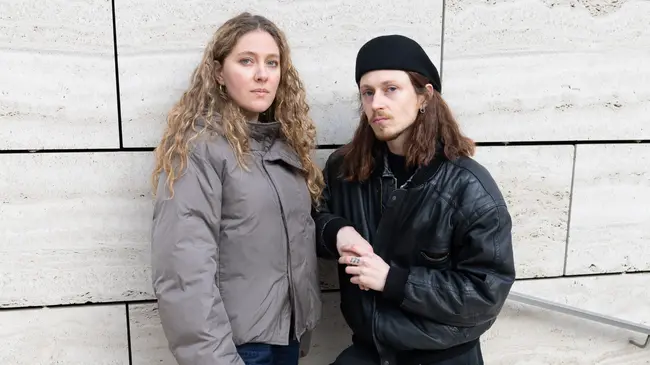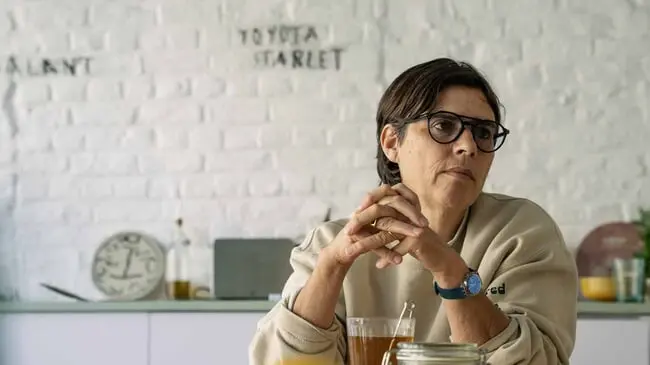Philosophies of the Carpet

The third edition of Dear Antwerp produced by DESINGEL is a celebration of the rich diversity of Antwerp’s creative talent. From 22 until 24 September a considerable range of performances and concerts will spread throughout the city. This includes Here and Then, Now and There on 23 September at Het Bos, a program by Antwerp artist Hussein Shikha. Hussein told us about his plans for the festival as well as sharing the foundation of his artistic practice and how we might create solidarity as artists.
Nice to see you! Could you tell us about yourself?
My name is Hussein Shikha. I am a multidisciplinary artist, graphic designer and researcher. I mainly work around themes that emerge from this one big project about southern Iraqi carpets. I always try to understand my current social-political context through the lens of these Iraqi carpets. These carpets are a craft practice, a visual culture that is being erased, unappreciated and misunderstood. I use my practice as a way to challenge my surroundings and examine possible shifts towards more inclusive and less Eurocentric discourses.
<img class="editorial-image-50-left" src="https://cdn.prod.website-files.com/61eebcc683107b99137f4423/64fb28ff9552ef3905a66426_HusseinShikha(c)LinaVanHulle_DifferentClassOnline-5.webp"/>
<img class="editorial-image-50-right" src="https://cdn.prod.website-files.com/61eebcc683107b99137f4423/64fb28fbeed3d4839e2dea4a_HusseinShikha(c)LinaVanHulle_DifferentClassOnline-6.webp"/>
What aspects of these carpets are most relevant to you?
First and foremost it is a visual language that speaks to me deeply. I find them beautiful, truly. It's something that sparks so much joy: the colours, the patterns, the way that the imagery is constructed. They are not only aesthetically joyful but are also joyful in the way that they built communities. I like to call these aspects the ‘philosophies of the carpets’.
It's something that sparks so much joy, the colours, the patterns, the way that the imagery is constructed
There is also a sense of urgency as the knowledge of this craft slowly disappears. I see the carpet as an object that has quite literally been colonised, devalued and forgotten. From the British mandate that happened in Iraq to Saddam’s decimation of the Mesopotamian marshes, the ways in which the rivers flowed were destroyed and disrupted. The people who made these carpets depended on these rivers to weave. And by the way, the stories held within these carpets are stories derived from one of the earliest civilisations. Let’s not forget!
<img class="editorial-image-50-left" src="https://cdn.prod.website-files.com/61eebcc683107b99137f4423/64fb28fc8d22031b6ddc665a_HusseinShikha(c)LinaVanHulle_DifferentClassOnline-2.webp"/>
<img class="editorial-image-50-right" src="https://cdn.prod.website-files.com/61eebcc683107b99137f4423/64fb28fe78a92d721cf16975_HusseinShikha(c)LinaVanHulle_DifferentClassOnline-3.webp"/>
As a first-generation immigrant who studied in academia, which discredited my intersectional experience, as someone who grew up with different [aesthetic] values and ways of viewing the world, I feel like my body went through a similar process to these carpets. ‘Less is more’ didn’t feel like more to me. ‘Ornamentation as a crime’ didn’t seem very criminal to me. Beauty being not ‘reasonable enough’ seemed like a wasted potential to me. The carpet became a metaphor through which I could understand my socio-political position.
The carpet became a metaphor to understand my socio-political position
So how will you be developing this work for the Dear Antwerp festival? What will you be presenting?
Well, for this festival I wanted to invite other artists who are also busy with these themes to share their experiences, their tools or the ways that they interpret and visualise the world. It is a collaborative effort where everyone will be sharing their experiences. I invite artists from different backgrounds. I don’t mean to say that all the diversities are here. It's more about seeing how different people interact with these problems that are present.
So you’re curating a platform for other voices to explore these themes?
Yes, and I’m a part of it as well. I don't know if I can use the word curating, it's more that I want to be part of an awesome programme, so how can I make one? There will be many talks, performances, people exhibiting their work and people activating the exhibition.
The people who are part of this festival are the dream team I want to be part of!
<img class="editorial-image" src="https://cdn.prod.website-files.com/61eebcc683107b99137f4423/64fb28f99978998e201f10eb_HusseinShikha(c)LinaVanHulle_DifferentClassOnline-7.webp"/>
And you’ve worked with Het Bos before?
I love Het Bos, I love what they do, I love what they stand for, I love how they open up, they create this platform. I exhibited for the first time ever there, it's so nice to come back and they have just welcomed me with open arms.
So how do you find being an artist in Antwerp generally?
I am lucky to have very nice links. I did the Advanced Masters at Sint-Lucas and that gave me a way to contextualise or frame my work. What I do is not the usual, I do a lot of workshops, I invite people to discuss and share tools, and I exhibit sometimes.
<img class="editorial-image-50-left" src="https://cdn.prod.website-files.com/61eebcc683107b99137f4423/64fb28fc7272982ba5552705_HusseinShikha(c)LinaVanHulle_DifferentClassOnline-8.webp"/>
<img class="editorial-image-50-right" src="https://cdn.prod.website-files.com/61eebcc683107b99137f4423/64fb28fce87d05f0a95fcc61_HusseinShikha(c)LinaVanHulle_DifferentClassOnline-10.webp"/>
I know you work with many different people, how do you collaborate with other artists?
Collaboration makes certain things easier and I found my soulmate collaborator in the arts. I heard that it's not always so easy. Her name is Sadrie Alves, she's amazing and she's also going to be participating in the festival and doing a performance with Désirée Cerocién.
We can better support each other as artists by being in solidarity with each other. We should share our tools of how to manoeuvre and interact with the world because it's not so easy to understand.
We should share our tools of how to manoeuvre and interact with the world
Do you have future plans you’d like to share with us?
I'm super excited about weaving a carpet in the textile museum in Tilburg. It's a commission piece that's going to be exhibited in October at Extra City. It’s going to be the first time I'm weaving a carpet for real. I have always been working around these carpets, be it with stamps, digitally, or by other means, but I never actually woven one. In this case, it being a southern Iraqi carpet, I am actually knotting it rather than weaving. It is exciting to see these carpets exist in this new temporality.
<div class="editorial-banner"> <div class=“editorial-credits”> @hussein.shikha <br/> 23.09.2023 - Dear Antwerp: Hussein Shikha - Here and then, now and there - Antwerp, Het Bos (DESINGEL) <br/> Reserve your free spot for this festival as a Different Class member. </div></div>
Different Class works with the interest of their community at heart.
Our work’s purpose is to foster a solid network for independent artists, those who love them, and those who want to support them. Become a member to contribute to the local Belgian art scene.





